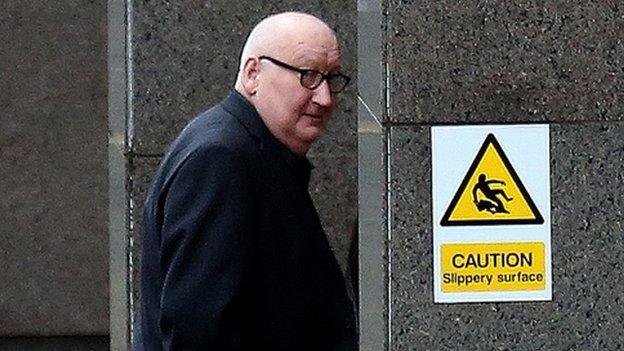Glasgow bin lorry crash: Family to prosecute Harry Clarke
- Published
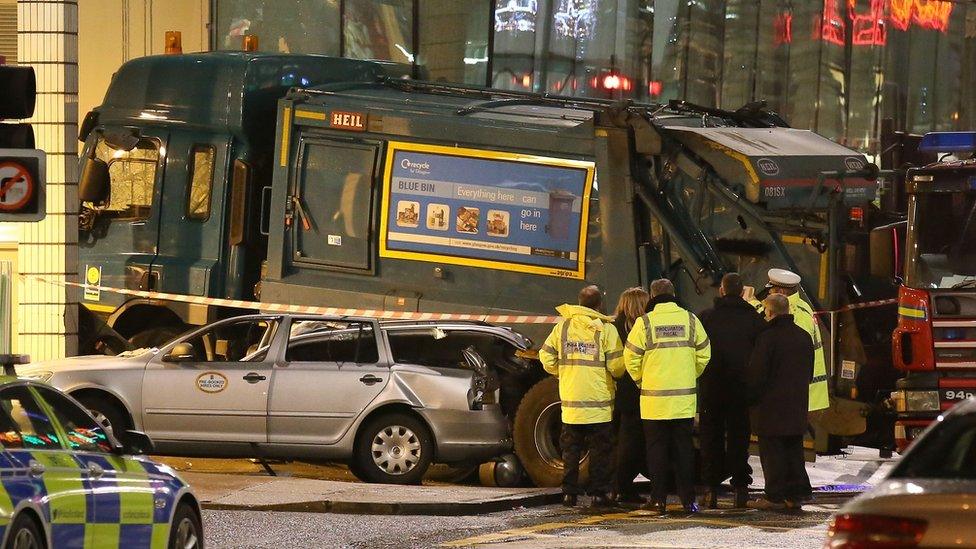
A family which lost three members in the Glasgow bin lorry crash is to go ahead with a bid to stage a private prosecution of the driver.
The decision came after an inquiry found that the tragedy could have been avoided if Harry Clarke had not lied about his history of blackouts.
Mr Clarke, 58, was unconscious when the lorry veered out of control on 22 December 2014, killing six people.
The inquiry found he had "repeatedly lied in order to gain and retain jobs".
Relatives of Erin McQuade and Jack and Lorraine Sweeney made the announcement about the private prosecution after a fatal accident inquiry (FAI) into the crash published its findings.
In their statement, they criticised a decision by the Crown Office not to prosecute Mr Clarke and said they had instructed their own lawyers to take action.
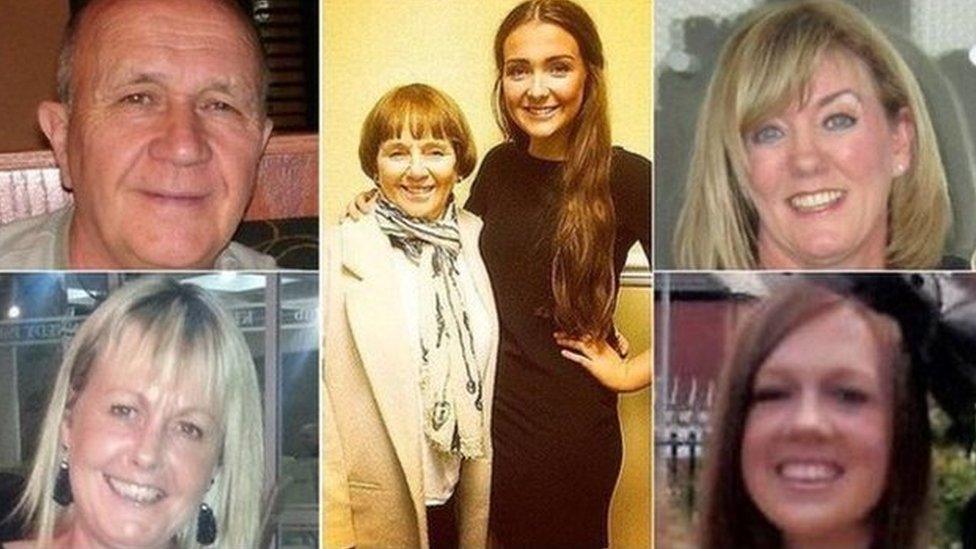
(Clockwise from top left) Jack Sweeney, Lorraine Sweeney, Erin McQuade, Jacqueline Morton, Stephenie Tait and Gillian Ewing were killed in the crash
The family said: "The family note the press release by the Crown and they contend they were right not to prosecute the driver.
"We firmly remain of the view that they are wrong as is their interpretation of the findings and recommendations.
"As a result we have instructed our solicitor to commence a prosecution against the driver."
The family's statement came after the Crown Office said: "There are no findings in the determination that undermine the decisions not to prosecute the driver.
"There was no finding that the driver knew or ought to have known that he was unfit to drive."
Standard of proof
The statement concluded: "We note the sheriff's findings on the driver's motivation to retain or gain employment.
"It is important to note the sheriff was considering evidence at an FAI where a lesser standard of proof is required and where more relaxed rules of evidence apply.
"A criminal prosecution requires sufficient evidence to the much higher standard beyond reasonable doubt."
The fatal accident inquiry (FAI) at Glasgow Sheriff Court, before Sheriff John Beckett, was set up after the Crown Office decided not to prosecute anyone over the crash.
The inquiry, which concluded in August, examined the circumstances of the tragedy.

What have we learned?
Sheriff Beckett's determination is critical in particular of driver Harry Clarke, stating outright that the crash might have been avoided had he not lied about his medical history.
But there are also implications for Glasgow City Council and potentially all local authorities; for doctors and GPs; and for the DVLA and driver licensing right across the UK. It includes appeals to government ministers and could see changes to the law.
As well as eight "reasonable precautions" which could have prevented the crash - all relating to Mr Clarke's health - the sheriff outlined 19 recommendations which could reduce the chances of such an incident recurring in future.
Read more from BBC Scotland reporter Philip Sim, who covered the inquiry at Glasgow Sheriff Court

In his report, Sheriff Becket concluded: "The most effective measure to prevent such an occurrence would be to seek to avoid drivers becoming incapacitated at the wheel.
"Responsibility in that regard lies with drivers themselves and Driver and Vehicle Licensing Agency (DVLA).
"It may well be that the single most useful outcome of this inquiry would be to raise awareness of the dangers involved in driving if subject to a medical condition which could cause the driver to lose control of a vehicle."
During evidence at the inquiry, it emerged that Mr Clarke had suffered an episode of neurocardiogenic syncope.
He passed out at the wheel while the bin lorry was on Queen Street in Glasgow city centre, just days before Christmas.
Just 19 seconds later, the vehicle came to rest against the Millennium Hotel in George Square, leaving six people dead and 17 injured.
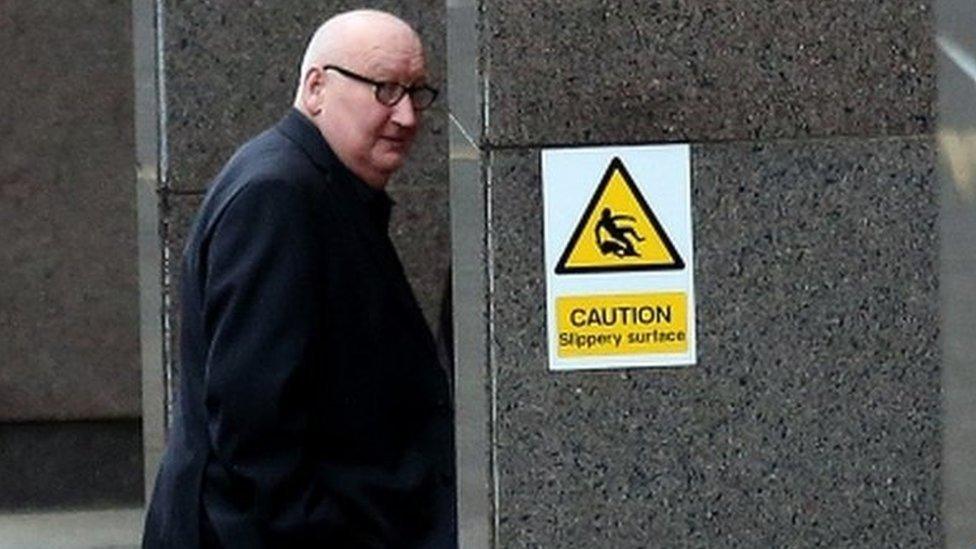
Harry Clarke was unconscious at the wheel when the bin lorry went out of control, killing six people
Those killed in the crash were Erin McQuade, 18, her grandparents Jack Sweeney, 68, and his 69-year-old wife Lorraine, from Dumbarton, Stephenie Tait, 29, and Jacqueline Morton, 51, both from Glasgow, and Gillian Ewing, 52, from Edinburgh.
After hearing five weeks of evidence earlier this year, Sheriff Beckett issued a determination which identifies eight reasonable precautions which could have prevented the tragedy.
All relate to an earlier blackout Mr Clarke experienced at the wheel of a bus on 7 April 2010 and his subsequent failure to fully disclose his medical history.
Sheriff Beckett said Mr Clarke could have "told the whole truth" to his doctors about this incident, "refrained from continuing to drive buses" and provided "true and accurate information about his medical history" in later health questionnaires and assessments.
Other precautions relate to doctors advising Mr Clarke to notify the DVLA and clarifying the circumstances of his blackout "before concluding that he had suffered a simple faint".
Sheriff's recommendations
A final precaution would have been for his then employer, bus firm First Glasgow, to have "provided a full, accurate and fair employment reference to Glasgow City Council".
The inquiry heard that the council was not made aware that Mr Clarke faced disciplinary procedures at First Bus, related to repeated sick leave, when he left First Bus.
Sheriff Beckett also made 19 recommendations which covered possible legislative changes, disclosure of medical information, the DVLA, Glasgow City Council and local authorities in general.
One of the most significant is for the UK transport secretary to look at whether doctors should be given greater freedom, or an obligation, to report fitness to drive concerns directly to the DVLA.
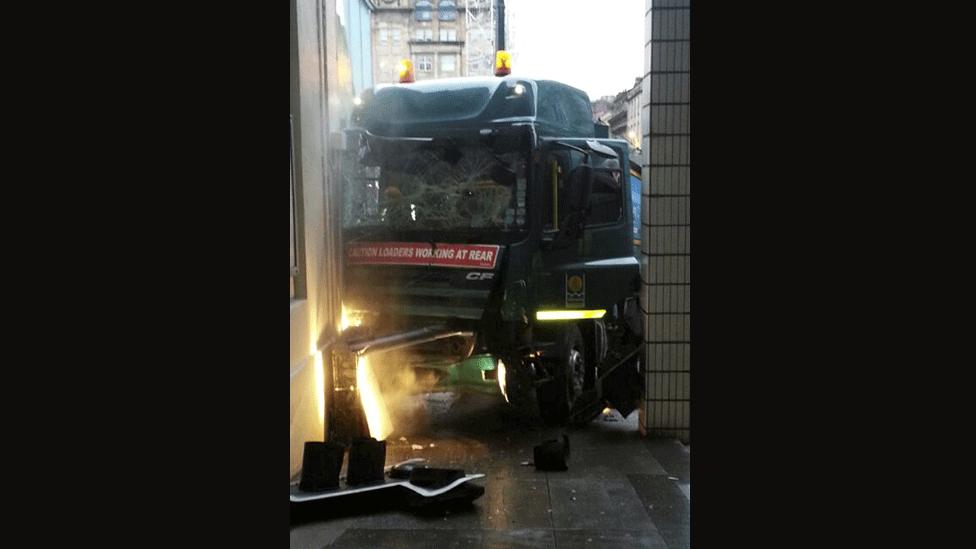
The bin lorry came to a stop outside the Millennium Hotel in George Square
There is also a call for the transport secretary to consult on how best to ensure that the DVLA has the proper information to make fitness to drive licensing decisions.
Sheriff Beckett said part of this should consider increasing the penalties and altering the method of prosecution for non-disclosure.
His report also calls on the DVLA to provide greater clarity and guidance on how people who suffer losses of consciousness should be treated in respect of fitness to drive.
He also recommends the DVLA should "change its policy" so relevant information on fitness to drive, from third parties such as the police, could be investigated.
Sheriff Beckett also said the agency should "redouble its efforts to raise awareness of the implications of medical conditions for fitness to drive".
A DVLA spokesman said: "We are carefully considering the recommendations in the report."
The General Medical Council said vital "lessons were learned" from the crash.
Chief executive Niall Dickson said: "We will be studying the report in detail and any implications for the GMC and its responsibilities.
'The responsibility for informing the DVLA about medical conditions sits first and foremost with the patient.
"But doctors have responsibilities too and we are clear that they do have a vital role in helping to keep the public safe."
- Published7 December 2015
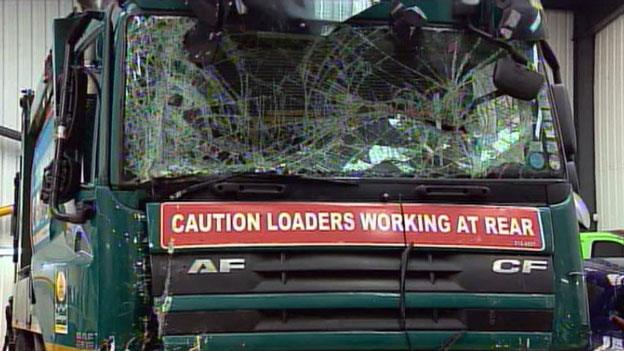
- Published7 December 2015
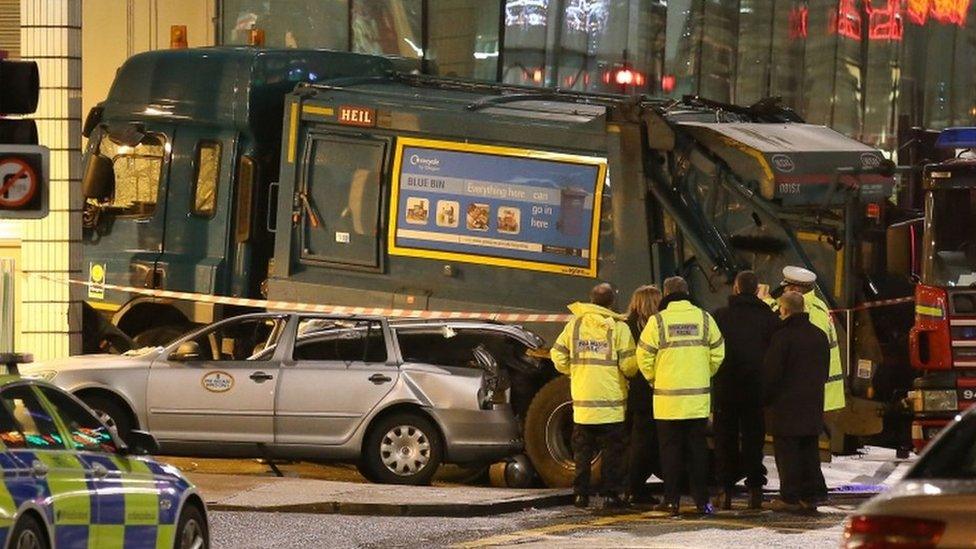
- Published13 November 2015

- Published3 November 2015
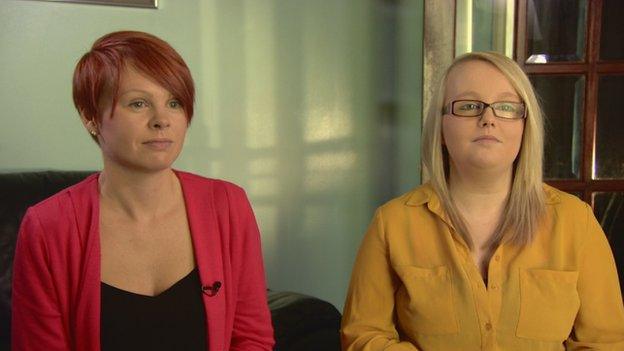
- Published3 November 2015
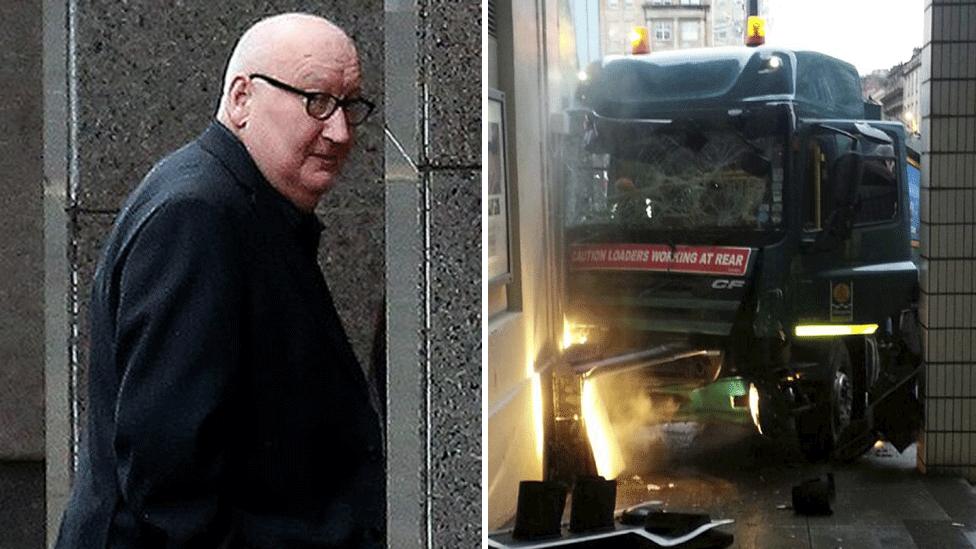
- Published28 August 2015
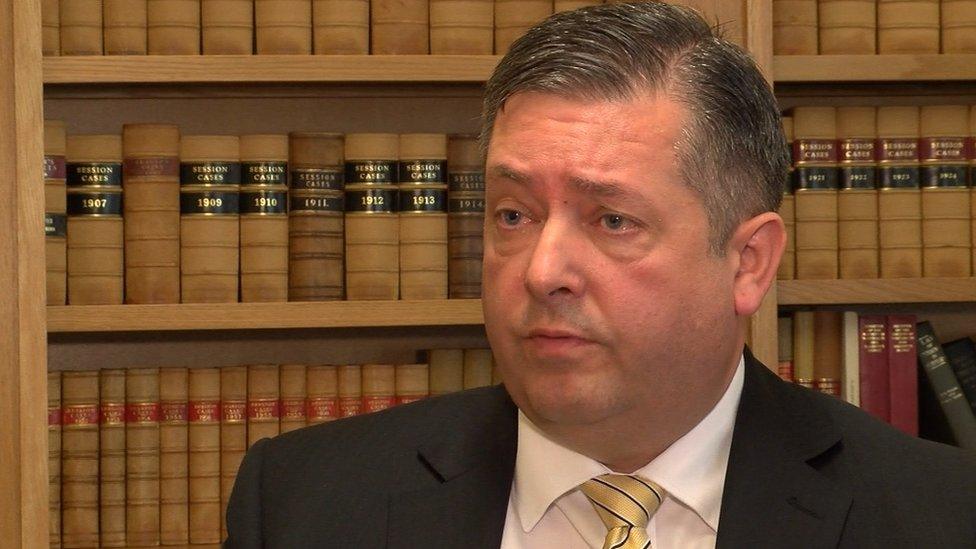
- Published21 August 2015
